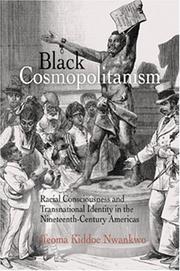| Listing 1 - 5 of 5 |
Sort by
|
Book
ISBN: 9780812223231 Year: 2005 Publisher: Philadelphia University of Pennsylvania Press
Abstract | Keywords | Export | Availability | Bookmark
 Loading...
Loading...Choose an application
- Reference Manager
- EndNote
- RefWorks (Direct export to RefWorks)
Book
ISBN: 9780812292121 Year: 2014 Publisher: Philadelphia
Abstract | Keywords | Export | Availability | Bookmark
 Loading...
Loading...Choose an application
- Reference Manager
- EndNote
- RefWorks (Direct export to RefWorks)
Multi
ISBN: 9780812292121 9780812238785 Year: 2014 Publisher: Philadelphia, Pa University of Pennsylvania Press
Abstract | Keywords | Export | Availability | Bookmark
 Loading...
Loading...Choose an application
- Reference Manager
- EndNote
- RefWorks (Direct export to RefWorks)

ISBN: 0812238788 1322510954 0812290631 0812223233 081229212X Year: 2005 Publisher: Philadelphia, Pennsylvania : University of Pennsylvania Press,
Abstract | Keywords | Export | Availability | Bookmark
 Loading...
Loading...Choose an application
- Reference Manager
- EndNote
- RefWorks (Direct export to RefWorks)
What are the perceived differences among African Americans, West Indians, and Afro Latin Americans? What are the hierarchies implicit in those perceptions, and when and how did these develop? For Ifeoma Kiddoe Nwankwo the turning point came in the wake of the Haitian Revolution of 1804. The uprising was significant because it not only brought into being the first Black republic in the Americas but also encouraged new visions of the interrelatedness of peoples of the African Diaspora. Black Cosmopolitanism looks to the aftermath of this historical moment to examine the disparities and similarities between the approaches to identity articulated by people of African descent in the United States, Cuba, and the British West Indies during the nineteenth century.In Black Cosmopolitanism, Nwankwo contends that whites' fears of the Haitian Revolution and its potentially contagious nature virtually forced people of African descent throughout the Americas who were in the public eye to articulate their stance toward the event. While some U.S. writers, like William Wells Brown, chose not to mention the existence of people of African heritage in other countries, others, like David Walker, embraced the Haitian Revolution and the message that it sent. Particularly in print, people of African descent had to decide where to position themselves and whether to emphasize their national or cosmopolitan, transnational identities.Through readings of slave narratives, fiction, poetry, nonfiction, newspaper editorials, and government documents that include texts by Frederick Douglass, the freed West Indian slave Mary Prince, and the Cuban poets Plácido and Juan Francisco Manzano, Nwankwo explicates this growing self-consciousness about publicly engaging other peoples of African descent. Ultimately, she contends, these writers configured their identities specifically to counter not only the Atlantic power structure's negation of their potential for transnational identity but also its simultaneous denial of their humanity and worthiness for national citizenship.
African Americans --- American literature --- Blacks --- Cosmopolitanism --- Ethnicity in literature --- Race awareness in literature --- Transnationalism --- West Indian literature --- Negroes --- Ethnology --- Caribbean literature --- Trans-nationalism --- Transnational migration --- International relations --- Political science --- Internationalism --- English literature --- Agrarians (Group of writers) --- Negritude --- African American intellectuals --- Intellectual life --- Race identity --- African American authors&delete& --- History and criticism --- Ethnic identity --- Black persons --- African American authors --- Black people --- Cosmopolitanism. --- Transnationalism. --- Race identity. --- Intellectual life. --- African Studies. --- African-American Studies. --- American History. --- American Studies. --- Cultural Studies. --- Literature.
Book
ISBN: 0472901206 0472070967 1282944762 9786612944765 0472027476 0472050966 9780472901203 9780472070961 9781282944763 9780472027477 Year: 2010 Publisher: Ann Arbor : University of Michigan Press,
Abstract | Keywords | Export | Availability | Bookmark
 Loading...
Loading...Choose an application
- Reference Manager
- EndNote
- RefWorks (Direct export to RefWorks)
Along with linked modes of religiosity, music and dance have long occupied a central position in the ways in which Atlantic peoples have enacted, made sense of, and responded to their encounters with each other. This unique collection of essays connects nations from across the Atlantic---Senegal, Kenya, Trinidad, Cuba, Brazil, and the United States, among others---highlighting contemporary popular, folkloric, and religious music and dance. By tracking the continuous reframing, revision, and erasure of aural, oral, and corporeal traces, the contributors to Rhythms of the Afro-Atlantic World collectively argue that music and dance are the living evidence of a constant (re)composition and (re)mixing of local sounds and gestures.
Popular music --- Blacks --- Dance --- Hip-hop --- History and criticism. --- Music --- History. --- Hip-hop culture --- Hiphop --- African American arts --- Popular culture --- Dances --- Dancing --- Amusements --- Performing arts --- Balls (Parties) --- Eurythmics --- Negroes --- Ethnology --- Music, Popular --- Music, Popular (Songs, etc.) --- Pop music --- Popular songs --- Popular vocal music --- Songs, Popular --- Vocal music, Popular --- Cover versions --- Black persons --- Black people --- Hip-hop. --- Negro music --- Negro songs --- Topical songs (Negro) --- Topical songs (Negroes)
| Listing 1 - 5 of 5 |
Sort by
|

 Search
Search Feedback
Feedback About UniCat
About UniCat  Help
Help News
News